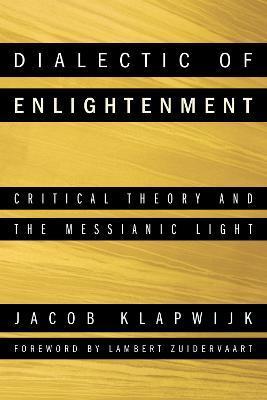Dialectic of Enlightenment

Dialectic of Enlightenment
Dialectic of Enlightenment is a thought-provoking introduction to the Frankfurt School of Critical Theory. Max Horkheimer and Theodor Adorno first identified the ""dialectic of enlightenment"" when fascism was on the rampage in Europe. They warned that enlightened reason and societal freedom threaten to revert into blindness and oppression. Herbert Marcuse and the young Jurgen Habermas elaborated their Critical Theory, declaring that post-war society has not escaped this dilemma, blinded as it is by ideology, pseudo-democracy, and mass manipulation. Critical Theory aims to unmask modern reason and liberate society. But a fundamental question keeps coming back: how can this critique of modernity remain viable within a repressive societal system? Is reason in the modern world indeed doomed to self-destruct? Does rationality inevitably lead to domination and oppression? Jacob Klapwijk argues that the dialectic of enlightenment proves to be a faith, a mythical faith encouraging resignation and despair. Instead we need a wholesome reason, one inspired by a messianic faith. Dialectic of Enlightenment is an important book for students of philosophy, theology, and the social sciences. It invites them to a renewed criticism of the mythological traits and self-destructive tendencies of modern reason. It also offers a perspective of hope to all who share the author's concern about the direction of today's globalizing world. ""Klapwijk presents a rich account of the various ways in which critical theorists--specifically Marcuse, Horkheimer, Adorno, and Habermas--reconstructed the legacy of the enlightenment for their respective social theories. He gives a convincing account of how key the enlightenment was for each, but also how ambivalent each author was towards its legacy. Particularly helpful are Klapwijk's own critical assessments of the problems of constructing social theory upon such pre-theoretical grounds and his offer of a radicalized view of Adorno's messianism as an alternative."" --James Swindal Philosophy Department Duquesne University ""His study demonstrates a deep continuity among Adorno, Horkheimer, Marcuse, and the early Habermas, amid their differences. Klapwijk indicates how this continuity is a source of both strengths and weaknesses. The challenge for his readers is to reach their own assessments about the Frankfurt School's provocative and penetrating account of the dialectic of enlightenment."" --from the Foreword by Lambert Zuidervaart Jac
124.00Lei
124.00Lei
Livrare in 2-4 saptamani
Descrierea produsului
Dialectic of Enlightenment is a thought-provoking introduction to the Frankfurt School of Critical Theory. Max Horkheimer and Theodor Adorno first identified the ""dialectic of enlightenment"" when fascism was on the rampage in Europe. They warned that enlightened reason and societal freedom threaten to revert into blindness and oppression. Herbert Marcuse and the young Jurgen Habermas elaborated their Critical Theory, declaring that post-war society has not escaped this dilemma, blinded as it is by ideology, pseudo-democracy, and mass manipulation. Critical Theory aims to unmask modern reason and liberate society. But a fundamental question keeps coming back: how can this critique of modernity remain viable within a repressive societal system? Is reason in the modern world indeed doomed to self-destruct? Does rationality inevitably lead to domination and oppression? Jacob Klapwijk argues that the dialectic of enlightenment proves to be a faith, a mythical faith encouraging resignation and despair. Instead we need a wholesome reason, one inspired by a messianic faith. Dialectic of Enlightenment is an important book for students of philosophy, theology, and the social sciences. It invites them to a renewed criticism of the mythological traits and self-destructive tendencies of modern reason. It also offers a perspective of hope to all who share the author's concern about the direction of today's globalizing world. ""Klapwijk presents a rich account of the various ways in which critical theorists--specifically Marcuse, Horkheimer, Adorno, and Habermas--reconstructed the legacy of the enlightenment for their respective social theories. He gives a convincing account of how key the enlightenment was for each, but also how ambivalent each author was towards its legacy. Particularly helpful are Klapwijk's own critical assessments of the problems of constructing social theory upon such pre-theoretical grounds and his offer of a radicalized view of Adorno's messianism as an alternative."" --James Swindal Philosophy Department Duquesne University ""His study demonstrates a deep continuity among Adorno, Horkheimer, Marcuse, and the early Habermas, amid their differences. Klapwijk indicates how this continuity is a source of both strengths and weaknesses. The challenge for his readers is to reach their own assessments about the Frankfurt School's provocative and penetrating account of the dialectic of enlightenment."" --from the Foreword by Lambert Zuidervaart Jac
Detaliile produsului










